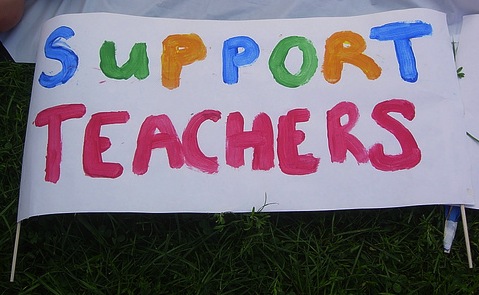Who will save our schools, and public education?
Not Premier Dalton McGuinty, who’s bought into the common obsession that the money “just isn’t there.” So he freezes public sector wages, pulling even more money out of the economy, assuring there’ll be even less in taxes to spend on programs, leading to the same death spiral that Europe is following. I know high-school kids who understand this better than Dalton, but maybe it’s because they can still take economics and business courses — although his stress on standardized tests in the “basics” is undermining all that.
Not titans of business like Bill Gates or the Weston foundation, who have anointed themselves to solve a (still unproven) crisis. They intend to apply business savvy and money in order to discover the most “effective” teaching methods, then sell and proselytize those. But effective teaching is simply teaching that’s effective, which can be almost anything that works for a particular teacher.
Think of your own best teachers. Did they teach the same way? Then why narrow down the focus? It’s because if there is one right way, and you can patent or monopolize it, you’ll profit vastly, as many businesses already do. I’m not making this up. A recent Reuters story, “Private firms eyeing profits from U.S. public schools,” called it “the next big thing . . . You start to see entire ecosystems of investment opportunity lining up. . . a golden moment has arrived.” Beware of billionaires bearing educational breakthroughs. Nor can you count on profs and experts, who are at the trough applying for grants from the same foundations and, even when they know better, often tread carefully.
Nor, I would argue, parents. They certainly care but, in a way, they care too much. They’re too close and have to favour their kids over others. It’s like the criminal justice system: You need to take it out of the hands of those most directly affected, like victims, or you get vendettas and chaos. Besides, all citizens have a stake in what happens to kids, not just parents.
That leaves, I’m afraid, teachers. And that means their unions. They can’t make themselves heard as individuals, few of us can. You can’t be “for” teachers and against their unions, as New Jersey Governor Chris Christie and Mitt Romney claim in the U.S., since in reality that means letting others speak for them. Unions are imperfect vehicles but they’re somewhat democratic, like elections, and give teachers a way to speak. Plus their record is pretty good.
I once asked former B.C. deputy minister of education Charles Ungerleider about this and he said almost all important reforms in public schools came via union bargaining. I asked him for a list and he gave me a long one, including mat leave, reduced class size, special needs classes. You can see this in Chicago’s current teachers’ strike, where they’ve already bargained for broader courses and are fighting the stupid-making push to expand the clout of standardized testing.
It doesn’t hurt that it’s in teachers’ own interests to demand, through their unions, that teachers be at the heart of the system — not just rhetorically but genuinely, by having a major say on what happens in their classrooms. Finland has what’s widely considered the world’s best system, and the best results in international tests, yet its teachers receive only mid-level salaries. What they do get is autonomy and prestige; they rank socially above doctors and lawyers, and the competition to get into university ed programs is fierce. The same impulses exist here. Teachers had already caved on money before McGuinty legislated them back; what rankled was his lack of respect. “Respect our Rights” — the new 3Rs — they chanted when they trooped outside after teaching this week.
That doesn’t mean teachers and unions are always right. I disagree with them not helping in extracurricular stuff. Kids with an academic bent can survive but others connect to school mostly through sports or band — and shouldn’t be deserted. I’d prefer they make their point more creatively, even illegally, through wildcats, sit-ins, teach-ins. After all, strikes were once illegal. If Stephen Harper or McGuinty think they can be outlawed again, it may be time for a refresher.
This article was first published in the Toronto Star.
Photo: andres musta/Flickr
What’s Harper up to? Award-winning journalist Karl Nerenberg keeps you in the know. Donate to support his efforts today.



